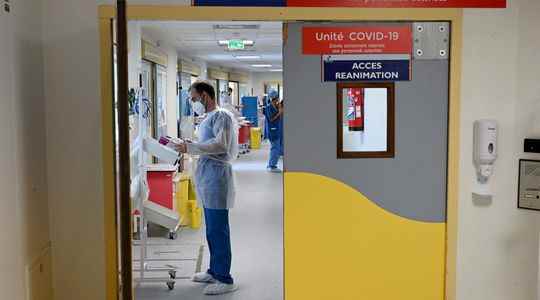It is a paradox worthy of the most contagious variant of Sars-Cov-2. While the pressure exerted by Covid-19 patients is gradually easing on the intensive care units, and the peak of contamination now seems to be behind us, the Covid-19 is managing to make more and more room for itself in the hospital. The logic is implacable: fewer and fewer patients are hospitalized for Covid-19, but more and more of them are hospitalized with the virus. This is explained “by the lesser severity and the higher contagiousness of Omicron, compared to the Delta variant”, underlines Public Health France. According to data posted online since January by the agency, the share of patients hospitalized due to Covid was nearly 90% in 2021, but it has tended to drop in recent weeks, while the proportion of patients hospitalized for another pathology, but positive for Sars-Cov-2, is growing more and more. Called patients with an “accessory” or “encounter” Covid, they currently represent around 30% of hospitalizations.
These patients, who are mostly vaccinated, often show fewer symptoms, and are not cared for in Covid services. “They show few respiratory signs and we think it is better for them to intern them in specialty services”, explains Jean-Christophe Lucet, the head of the Bacteriology, Hygiene, Virology, Parasitology Service at Bichat Hospital. , at the Assistance-publique Hôpitaux de Paris. “At the start of the epidemic, we had the principle of hospitalizing in the departments only the patients who really needed it”, explains this doctor, citing the example of a person positive for Covid-19, but admitted to the hospital. for a fracture and management in an orthopedic service. “But with Omicron and vaccination, these very strict measures have been relaxed.” In his hospital, only patients who come for respiratory problems are cared for in the Covid-19 services.
Apprehensions in some services
Since the end of December and the installation of Omicron, this number of Covid patients referred to specialty services has increased sharply. “There are a lot of positive patients since the Omicron wave, but thanks to vaccination almost none have had a serious form”, confirms Jean-Christophe Lucet. Isolation, strengthening of protocols… These arrivals, however, require changes. “It is not one or two patients that we can isolate in a single room, there we must create a Covid-19 sector within the service”, testifies Clarisse Audigier-Valette, pneumo-oncologist at the Toulon hospital center. .
For caregivers who have not always dealt with Covid-infected patients, this situation may cause some concern. “We must reassure them about the risk that this represents, there is also a form of apprehension in the care of these patients, so we explain to them that the patients are vaccinated and that they will not develop serious forms” , relates this pulmonologist.
Beyond the organizational aspects, Covid-19 can also cause more insidious forms of complications for patients. In addition to certain chronic pathologies, a Sars-CoV-2 infection can lead to significant resurgences of certain diseases. In some vaccinated people, the virus can result in mild flu-like symptoms, but at the same time lead to the sometimes sudden deterioration of an existing pathology. “For example, severe cardiac decompensation, or diabetes, this can take on significant proportions and force these patients to be hospitalized in dedicated departments”, explains Clarisse Audigier-Valette.
Deadlines for surgical operations
Finally, a positive test before surgery can upset the program. For patients to be operated, a positive test for Covid-19 imposes a delay of 4 to 7 weeks between the test and the intervention according to the recommendations issued by the French Society of Anesthesia and Resuscitation (SFAR). A framework that requires obvious adaptation according to the urgency of the intervention that the patient must undergo. “We have to go into detail and assess patient by patient the risk of the intervention in this context and the loss of chance that its postponement could entail”, explains Frédéric Le Saché, administrator of the SFAR.
However, the arrival of the Omicron variant, the multiplication of patients with “accessory Covid”, and vaccination should lead professionals to change these recommendations. “Vaccination has already made it possible to modulate the recommendations by reducing the waiting time in the event of Covid, now we are awaiting the results of studies to ensure that vaccinated people have fewer complications when they are operated on with the disease. “, details Frédéric Le Saché.
For some caregivers, the Omicron variant and its endless cases upset the protocol. “We are now awaiting the opinion of the SFAR on these deadlines, should we test everyone before the surgeries? And is it really worth it to postpone an operation and accumulate delays? These are questions we need to think about,” asks Clarisse Audigier-Valette. Reviewing protocols, adapting to the unknowns and upheavals of Covid-19, also a way for the hospital to live with the virus.
